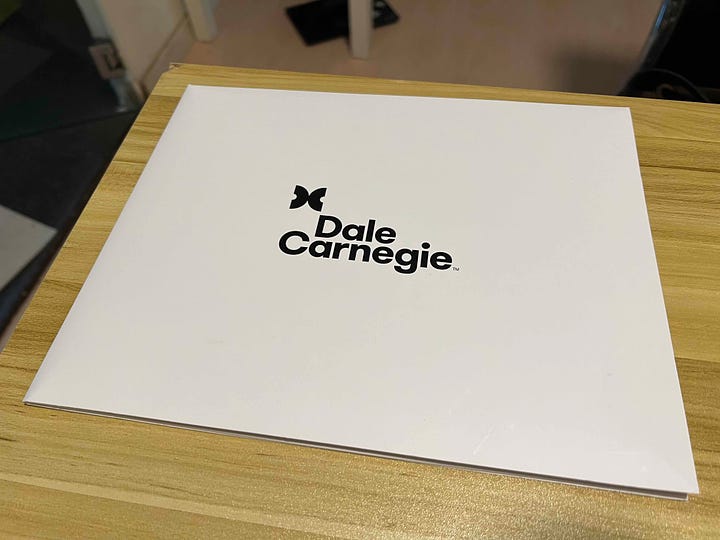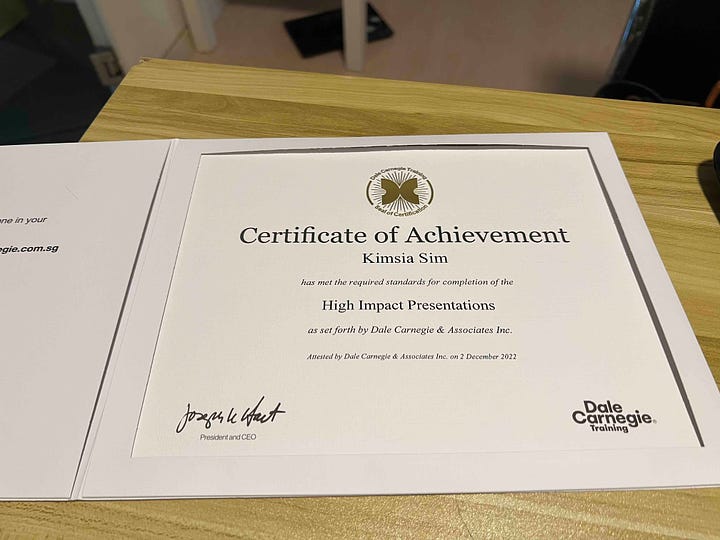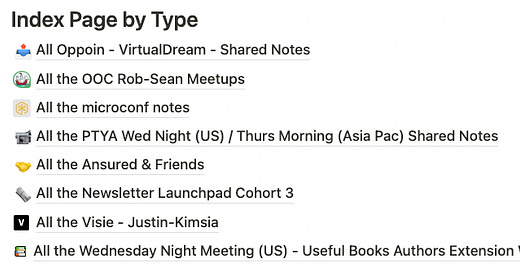I attended a John David Smith workshop via Rob Fitzpatrick and Sean K Murphy’s online event a while ago during my newsletter hiatus.
John was trying to teach about the importance of using shared notes as part of online meetups. To make the meetup more lively, and interactive.
In the first 15 mins, I understood intellectually what John was teaching but was unmoved. Then, I toggled to see the shared notes document in Google Drive dedicated for this very workshop. And coincidentally in the 10 seconds I toggled over, Sean was writing some notes in one section and Rob was adding questions in a different section.
While, John was still speaking.
This was the moment I understood emotionally the value of having shared notes for online meetups.
The whole thing was indeed highly collaborative with the mixing of sync media (the zoom) with async media (the shared notes document). As a whole, the entire experience felt more real and intimate.
One Thing I Changed Since Then: Writing Shared Notes
For. Every. Meetup. After. That.
Whether it’s a course, a customer meeting, a feature demo, contract negotiations, I do mean every meetup after that. Even if it’s just 1-on-1. 😅
I wouldn’t foist my preference on other people. They are free to contribute to the Shared Notes, or not. During, or after the meetup. I just made it convenient for them if they choose to.
Some are wildly enthusiastic. But that’s a minority. And that’s all right with me. I don’t expect everyone to be equally enthusiastic as I am.
Now that I’ve tried it for over 20 different meetups, I can safely state the following advantages.
The advantages are:
It's better to take incomplete notes than no notes.
The effort of taking notes forces you to concentrate more when listening because you cannot write notes verbatim.
The shared notes serve as a kind of knowledge repository. “Oh, I remember I said something to so-and-so in this meeting. Let me look it up.”
Shared notes is an easy way to get participants interacting with one another.
Why Didn’t I Do This Earlier?
Whenever I find a good idea that’s obvious on hindsight, I like to ask myself why I didn’t think of this earlier.
John essentially gave me permission NOT to take notes verbatim and be okay with NOT capturing everything.
On reflection, I’ve always felt that note taking during meetings is a chore. This may have to do with my past experience. I had to serve two years in the military, a mandatory part of being a male citizen. And in that arena, note taking is usually the sole task of the underlings. The task is tedious because of the excruciating details with accuracy and precision.
No prizes for guessing who’s the underling in all these meetings. :)
John’s note-taking ethos are a lot more forgiving (no need to note down everything), democratic (anybody can jump in), and collaborative (and people do jump in!). The complete opposite of previous note-taking experience.
One Thing I Accepted: Getting Permission Over Getting New Information
Speaking of getting permission, I also took a Dale Carnegie High Impact Presentation two-day course recently.


During the course, all participants will have their presentations recorded. And I definitely could see how I became progressively more animated and confident across the 7 presentations I gave.
In a 1-on-1 feedback sessions with the trainers, I realized I’ve been carrying a narrative I had formed in my childhood years. I recalled one school teacher distinctly telling me NOT to use my hands too much during the oral exam components. And I’ve carried that with me ever since. Even when I’m no longer 10 years old.
If right now, I’m at the stage of seeking permissions one paid course at a time, then so be it. I accept it.
Silly, huh?

This is not the first time this has happened. And by this, I mean paying to get another person (a trainer, coach, or consultant) to give me permission for something I was already leaning towards or figured out.
The first couple of times this happened, I thought I was wasting my money.
“I’m here to learn new stuff”, I thought. If I came here to get permission for old thoughts I already had, I might as well just give myself the permission and save the money.
But, of course, now I’m a little wiser. Genuine transformations are difficult and the reasons are complex.
Who am I to nitpick? I have taken so many courses that taught me new concepts, and yet they never move the needle. If right now, I’m at the stage of seeking permissions one paid course at a time, then so be it. I accept it.
Especially when they do lead to genuine and long lasting changes in my actions and behaviors.
Elsewhere on the internet
While
was reviewing this newsletter, he pointed to his essay about Unsought Permissions. Which I thought is on theme for today’s newsletter. It has a killer opening too.It sounds sad that a 40-year old man needs permission from his parents, but we all look for permission in one form or another.

I usually won’t link to political articles, but there was this phrase "period of pupation" used by Angela Merkel, the recently retired German Chancellor whose tenure lasted 16 years (a long time in German politics) that captured my attention.
I’ve entered a period of reflection, and the hamster wheel phenomenon is getting less.
This year, especially the second half, feels like a period of pupation for me. I feel like saying more, but I am not finding the right words yet. Perhaps, the timing is not yet ripe.
When the time is ripe, you’ll be the first to know when it happens. :)
Taking a leaf from Angela Merkel, and Alexandra Allen, I’ll be taking another hiatus reflecting on the past year. Will be back in the middle of January 2023.
Merry Christmas, and happy holidays. All the best to you and your family in the New Year in 2023.
I want to thank , , Alvin T. of , and
for reading drafts of this.P.S. you can respond directly to this email. I read every reply. I'd love to hear from you.





